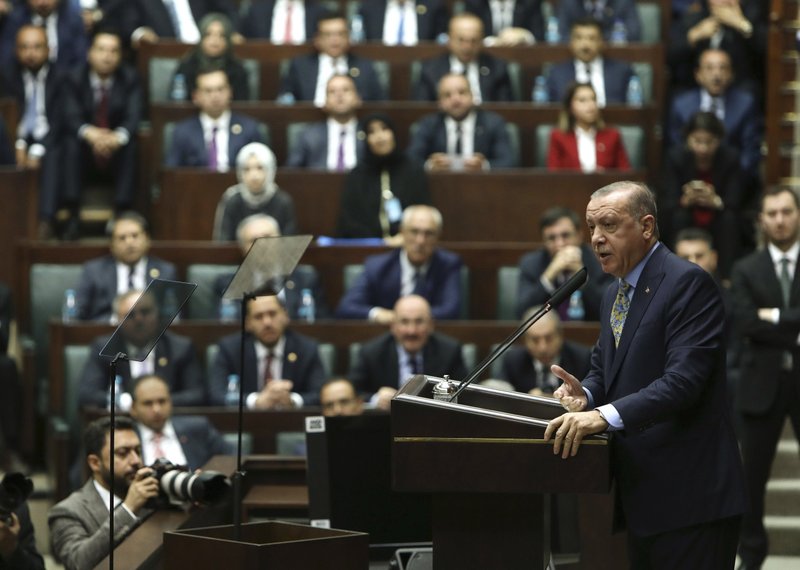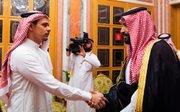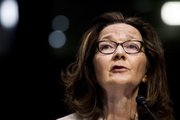ISTANBUL -- Turkish President Recep Tayyip Erdogan said Tuesday that the killing of Saudi journalist Jamal Khashoggi was a "planned" and "brutal" murder and called on Saudi Arabia to extradite 18 suspects to Turkey to face justice for the crime.
Meanwhile, President Donald Trump's administration moved Tuesday to revoke the visas of some Saudi officials implicated in Khashoggi's killing in its first punitive measure against its longtime Middle East partner.
Erdogan's comments, during a speech to his ruling party in Ankara, the Turkish capital, contradicted Saudi accounts that Khashoggi was killed when an argument inside the Saudi Consulate in Istanbul escalated into a fistfight. The Turkish leader did not directly accuse the Saudi leadership of involvement in the killing but strongly indicated that the Saudi investigation, which has resulted in the arrests of 18 people so far, has not yet reached high enough into the kingdom's ruling circles.
"It will not satisfy the public by just pinning this kind of matter on a few security and intelligence officers," he said. "Covering up this kind of savagery will hurt the conscience of all humanity."
"Saudi Arabia took an important step by accepting the murder. After this, we expect them to reveal those responsible for this matter. We have information that the murder is not instant, but planned," he said.
Erdogan did not address the most explosive allegations that have surfaced during the investigation -- notably that Khashoggi was dismembered after he was killed. And he did not present any of the evidence Turkey had gathered so far, including audio recordings investigators are said to possess that captured the moments when Khashoggi was killed.
The Saudi team that plotted the murder was first alerted, Erdogan said, after Khashoggi visited the consulate on Sept. 28.
"Planning and the work of a road map starts here," the president said. Beginning three days later, on Oct. 1, teams of Saudi agents begin arriving in Istanbul, with one team visiting wooded areas in and around Istanbul "for reconnaissance," Erdogan said, referring to areas that Turkish police later focused on as they searched for Khashoggi's body.
After another team arrives at the Istanbul consulate, "the hard disk on the consulate camera is removed," he added. The Saudi team consisted of "intelligence, security and forensic workers," Erdogan said.
Khashoggi entered the mission at 1:14 p.m. on Oct. 2. When he had not emerged a few hours later, his fiancee, Hatice Cengiz, who was waiting for him outside, alerted authorities, and an investigation was started, Erdogan said. Camera footage showed that Khashoggi had never left, he added.
Erdogan highlighted attempts by the Saudis to obstruct or cover up the killing, including a ruse involving a Saudi agent who was dressed like Khashoggi and captured on camera exiting the consulate.
"Why did 15 people gather in Istanbul the day of the murder? Who did these people receive orders from?" he asked. "Why was the consulate opened not immediately but days later for investigation? When the murder was obvious, why were inconsistent explanations given?"
"Why is the body still not found?"
Addressing the Saudi monarch, King Salman, Erdogan requested that the 18 Saudi suspects arrested so far be put on trial in Istanbul. But notably, he made no mention of 33-year old Crown Prince Mohammed bin Salman, whose possible role in the plot has come under scrutiny because of his almost complete consolidation of power in the kingdom as its de facto leader.
In a possible reference to the crown prince, who was put in charge of restructuring the Saudi intelligence directorate after Khashoggi's death, Erdogan said it was important that any Saudi investigation be carried out "by an impartial and fair delegation" with no connections to the murder.
VISA REVOCATIONS
In remarks Tuesday to reporters at the White House, Trump derided the initial Saudi denial of any wrongdoing and efforts to conceal what happened to Khashoggi.
"They had a very bad original concept," Trump said. "It was carried out poorly and the cover-up was one of the worst cover-ups in the history of cover-ups. Somebody really messed up and they had the worst cover-up ever."
Shortly after Trump made the comments, Secretary of State Mike Pompeo said the administration was moving to revoke the visas of Saudi government and intelligence agents suspected of involvement in the death of Khashoggi.
Visa records are confidential and Pompeo was not more specific about who the revocations would affect, but the State Department later said 21 "Saudi suspects" would have visas revoked or would be declared ineligible to enter the U.S.
"These penalties will not be the last word on this matter," Pompeo told reporters at the State Department. The administration "will continue to hold those responsible accountable. We're making very clear that the United States does not tolerate this kind of ruthless action to silence Mr. Khashoggi, a journalist, with violence," he said. "Neither the president or I am happy with this situation."
Members of Congress have demanded that sanctions be imposed on Saudi Arabia over the killing of Khashoggi, a U.S. resident and Washington Post contributor.
"In terms of what we ultimately do I'm going to leave it very much -- in conjunction with me -- up to Congress," Trump told reporters Tuesday in the Oval Office. He added that he wants to receive a bipartisan recommendation on penalties.
Trump has resisted calls thus far to cut off arms sales to the kingdom and Pompeo stressed the strategic importance of the U.S.-Saudi relationship.
Vice President Mike Pence said Tuesday that the death of Saudi writer Jamal Khashoggi "will not go without an American response" and that the CIA director was in Turkey to review evidence in the case.
"We want to know what happened. We're going to follow the facts," Pence said at the outset of an appearance at an event hosted by The Washington Post to discuss a planned space force. "We'll also make sure the world knows the truth of what happened."
He declined to say whether he had seen any intelligence that linked the Saudi crown prince to the killing.
"I know that when the CIA director returns, she will be briefing the president, myself and our entire team on what the Turks have assembled," Pence said about CIA Director Gina Haspel's trip to Turkey.
Asked about Erdogan's remarks earlier in the day, Pence said the notion of a premeditated attack "flies in the face of earlier assertions" by the Saudis.
"The world is watching," Pence said. "The American people want answers."
SAUDIS MEET KHASHOGGI'S SON
Separately, the official Saudi Press Agency published photos Tuesday of the king and the crown prince meeting two members of Khashoggi's family, including his son.
One photo showed the son, Salah, looking ashen-faced and shaking hands with the crown prince as a video cameraman stood in the background. Saudi Arabia's Foreign Ministry wrote on Twitter that the leaders shared "their deepest condolences and sympathy to the family of Jamal Khashoggi, may God rest his soul."
Saudi Foreign Minister Adel al-Jubeir said Tuesday that the kingdom was committed to a "comprehensive investigation" into the journalist's death and has dispatched a team to Turkey.
Speaking in Indonesia on Tuesday, al-Jubeir said the Saudi investigators had "uncovered evidence of a murder." He also vowed to put mechanisms in place that would prevent similar incidents in the future, without expanding upon what those would be.
During Erdogan's address Tuesday, lawmakers from his party sat mostly silent as the president detailed what his government knows about the operation that led to Khashoggi's death. But when he shifted to his demands of the Saudi royals, the audience cheered enthusiastically at the mentions of Turkey's sovereignty and authority to prosecute the suspects.
"For the first time, the president gave a clear statement about the details," said Mehdi Eker, a lawmaker and senior member of Erdogan's party. "The whole speech was aimed at getting answers."
Eker said Erdogan articulated the nation's priorities in the case: that there is a transparent and complete investigation that spares no official, no matter how senior, and that the suspects be extradited and tried in Turkey.
"This assassination happened in our country," he said. "We will be following up on both the bilateral level and the international level."
Asked if the president possessed evidence that the crown prince had directly ordered Khashoggi to be forced back to Saudi Arabia or assassinated, Eker responded, "Of course not."
"We do not have any clue about that," he said, but added that Turkey is seeking to learn more about the role of the Saudi consul general in Istanbul in Khashoggi's death. The consul general, Mohammed al-Otaibi, left Turkey last week and has not returned. Eker said the careful planning that began days before Khashoggi's killing makes Otaibi a central figure to the Turkish investigation.
Khashoggi, who had written columns critical of the Saudi leadership over the past year, went to the consulate on the afternoon of Oct. 2 to obtain documents that would allow him to remarry.
His death has cast a harsh light on the rule of Saudi Arabia's young crown prince, who has eased social restrictions at home while pursuing an unrelenting crackdown on rivals and critics, imprisoning hundreds. The crown prince has also tried to lure exiled dissidents such as Khashoggi, who lived in Virginia, back to Saudi Arabia, Khashoggi's friends and other exiles have said.
In Riyadh on Tuesday, Saudi authorities opened a landmark investment conference intended to signal afresh that the kingdom is open for business.
But the run-up to Tuesday's event has been marred by pullouts from a stream of Western investors and politicians, including Treasury Secretary Steven Mnuchin and International Monetary Fund Managing Director Christine Lagarde.
At its opening, Saudi Energy Minister Khalid Al-Falih described Khashoggi's slaying as "abhorrent."
"As we all know, these are difficult days for us in the kingdom of Saudi Arabia," he said. "Nobody in the kingdom can justify it or explain it. From the leadership on down, we're very upset of what has happened."
Information for this article was contributed by Kareem Fahim, Louisa Loveluck, Zeynep Karatas and John Wagner of The Washington Post; by Justin Sink and Nick Wadhams of Bloomberg News; and by Deb Riechmann, Jonathan Lemire, Matthew Lee, Christopher Torchia, Jon Gambrell, Susannah George, Suzan Fraser, Zeynep Bilginsoy, Bram Janssen and Aya Batrawy of The Associated Press.
A Section on 10/24/2018



